Subscribe now and get the latest podcast releases delivered straight to your inbox.
How to Create & Enforce Rules for an Online Community

Aug 23, 2019
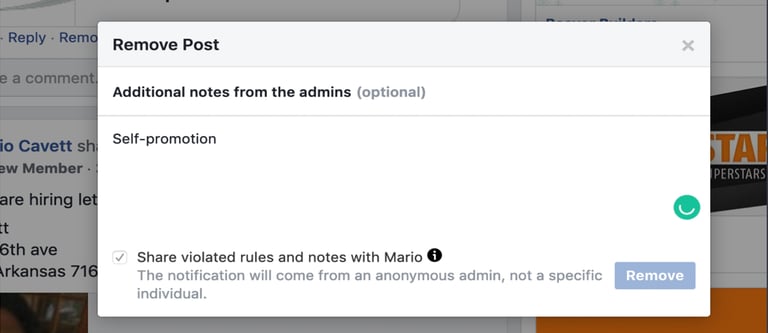
As one of my personal heroes, Monica Geller, would say: "Rules are good! Rules help control the fun."
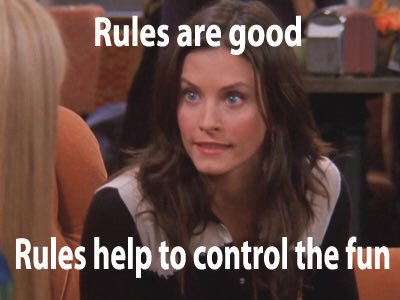
Nowhere is this more true than in online communities, where a lack of in-person interactions and absence of virtual guardrails can create conditions that favor self-promotion at best, and hate speech or harassment at worst.
As a member of several online communities — and the community manager of IMPACT Elite, IMPACT’s 5,000+ member Facebook group — I have seen first-hand the positive influence strong community rules can have, and the damage that can be done when online communities fail to set or enforce rules.
The good news is there are plenty of great examples of communities that have developed a strong set of rules for their members — but setting rules is just the first step.
Enforcing them can be a tricky balancing act, but done well, it creates the conditions in which your community will thrive, grow and add value to the lives of its members.
Examples of community rules
As the manager of an online community, I’ve spent a considerable amount of time reviewing how other group admins set, communicate, and enforce group rules in an effort to develop rules of our own.
Here is an example of how to do it right, how to do it wrong, and what we came up with as a result of our research.
Community rules done right
Meet Dogspotting.
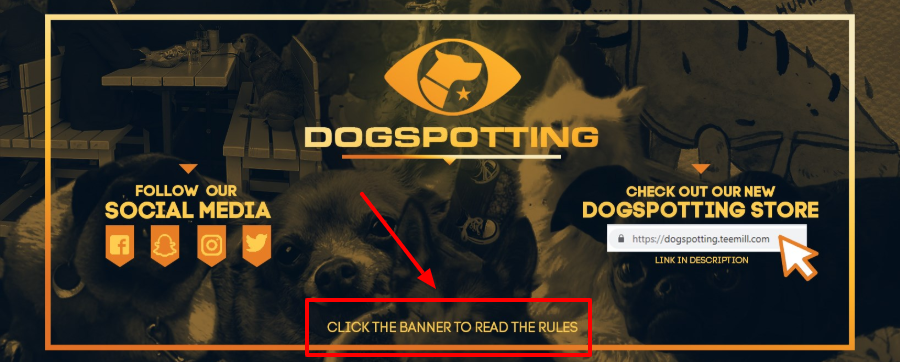
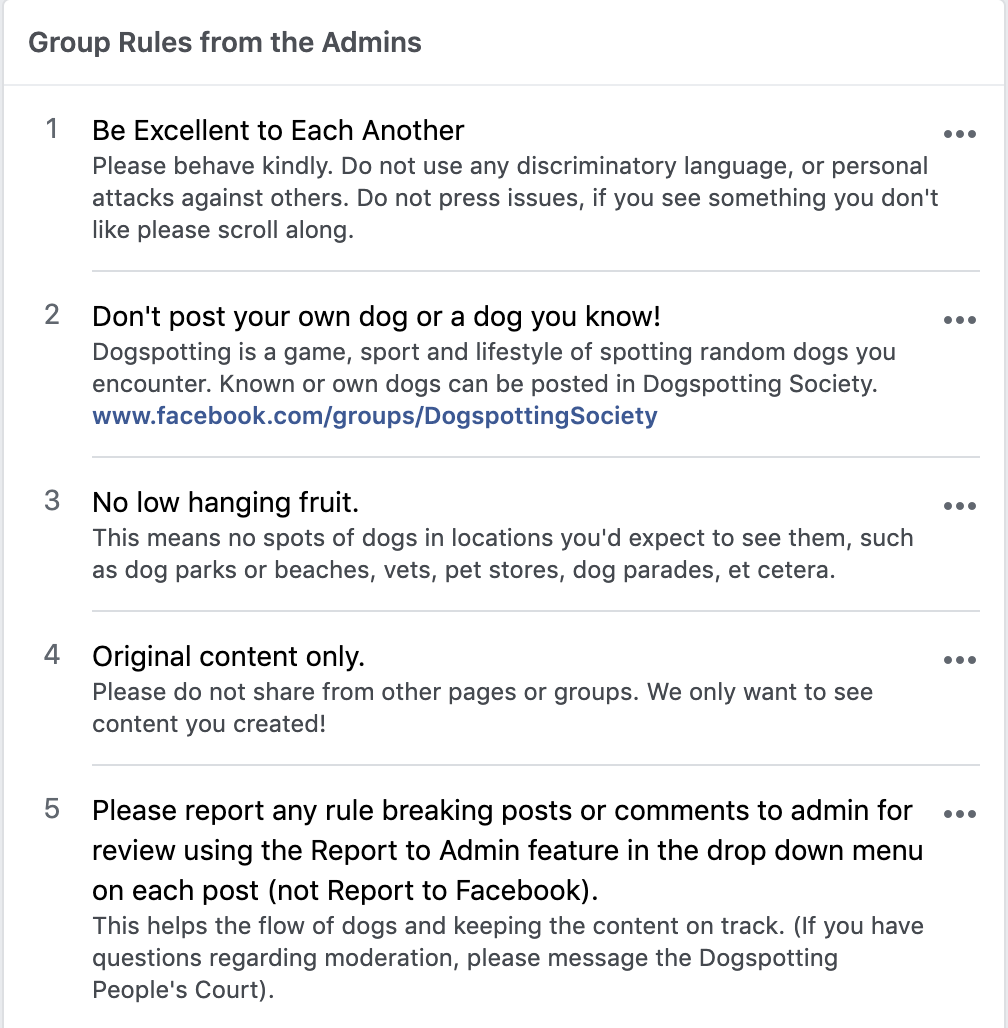
Dogspotting’s community rules are well done because they are clear, easy to find, and you can reference them easily when dealing with content.
I love that they reference the rules right in the banner image at the top of the group, and then again in a pinned post. There’s no way to miss them.
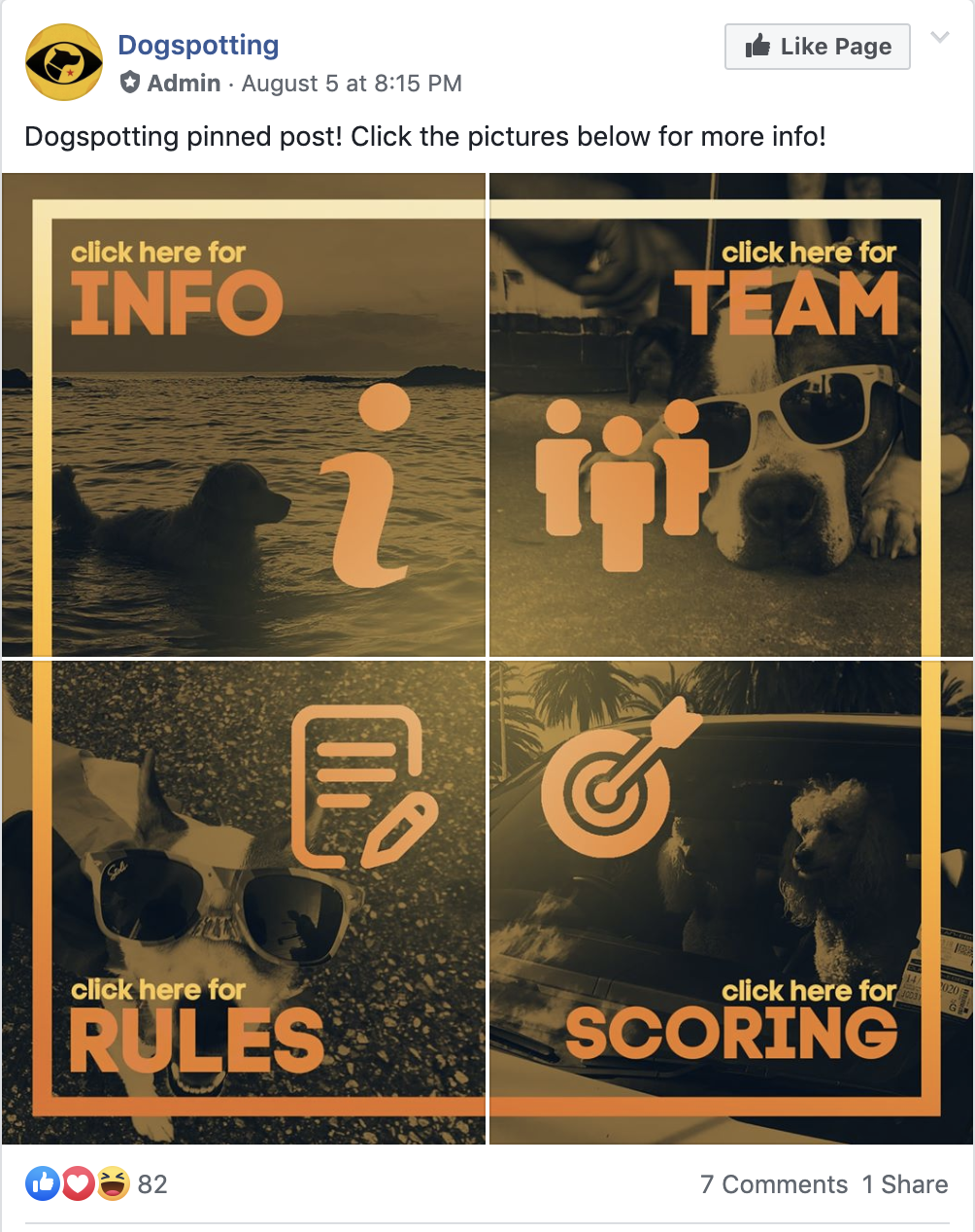
Community rules done wrong
I won’t share the name of this group (no need to shame the offender), but these community rules leave a lot to be desired.While well-intentioned, the rules that this group has set are vague, which makes them in-actionable.
It also makes them incredibly difficult to enforce by leaving so much room for misinterpretation.
-1.png)
Now, this is better than not having any rules at all, but rightfully your rules need to be written in a way that you can actually enforce them. They shouldn’t leave people confused about how to behave or what the expectations are like the “golden rule” above.
An example from IMPACT’s community
Here’s what we came up with for IMPACT Elite after reviewing scores of other communities’ rules.
We reference some of the rules that get broken the most right in our group description, and then spell everything out in detail in the rules themselves.
-2.png)
-2.png)
So far, these have worked really well for us. Yes, we do get occasional promotional or "spammy" posts, but overall, we have cultivated a community of individuals who understand what the group is about and want to maintain its quality for everyone.
Template for online community rules
The bottom line is that clarity, specificity, and ease of access are critical when it comes to creating rules for your online community.
If you’re thinking of starting an online community, or you already have a community but haven’t set rules, you might be wondering how to get started.
Here’s a simple template you can use to create rules for your group:
[Rules specific to your community]
Many communities will have similar rules around spam, self-promotion, and respect in general; people expect to see these.
You’ll want to put your own community’s rules first to draw attention to them and make sure people know if things are different around here.
For instance, in IMPACT Elite, I made sure to call out our pinned jobs and events threads. This way, people know not to clutter up the main community feed with job postings or upcoming events which can tend to be a problem otherwise.
[Rule related to self-promotion and sharing your own content]
Unless explicitly created for that purpose, most online communities have rules that prohibit or limit self-promotion, but make sure to be explicit about where your lines are.
For example, this neighborhood group does a great job of clearly defining limits on commercial postings as well as individual posts with items for sale.

If you find something is still happening often, you can come up with ways to make it even more clear.
The Podcasters’ Hangout group makes its rules regarding self-promotion crystal clear by stating them in the hero image at the top of the group.
-1.png)
Being specific about what is considered promotion in the context of your specific niche can go miles.
[Rules related to hate speech or bullying]
This is anything that could be considered offensive or hurtful to a specific group of people. It can be a tough area to tackle, but one that is essential today.
Here’s how we handled this for IMPACT Elite.
-2.png)
[A reminder to be respectful]
Most communities have a general reminder to be respectful, but consider getting more personal.
It helps outline what this looks like in your community specifically. For example, is there a rule against shaming others for mistakes you find in their content? Are their rules around debates?
Here’s an example from Women in MarTech.

This may go without saying, yes, but taking the time to reiterate the seemingly obvious helps instill your dedication to it.

[Rules about privacy]
When communities are private, the content in them is intended and assumed to be private as well. Remind members that if they’re going to screenshot, share, or quote content from the community they need to request permission from the original poster first.
Here’s a great example from Women of Email.
Enforcing your rules in your community
Strong, consistent enforcement is key to creating a positive experience for members of any online group.
I recommend that you start by featuring your community rules upfront in the group’s welcome content.
In Facebook Groups, that could mean mentioning them in the banner image as well as the “About” description and a pinned post.
On other platforms, that might mean adding them to the welcome email or onboarding message.
Some platforms have a dedicated space for community rules to live.
If not, you'll want to pin your rules or create a way for each new member to be introduced to the rules as they join.
The folks at Beyond Blue created a great page with an intro video and clear rules for their community.
You can see more here: https://www.beyondblue.org.au/get-support/online-forums/community-rules
It’s also a good idea to ask prospective members to agree to your rules upon joining.
We do that in IMPACT Elite and while there is no guarantee that people will thoroughly review our rules, it does serve as a reminder that we’re serious about enforcing them.
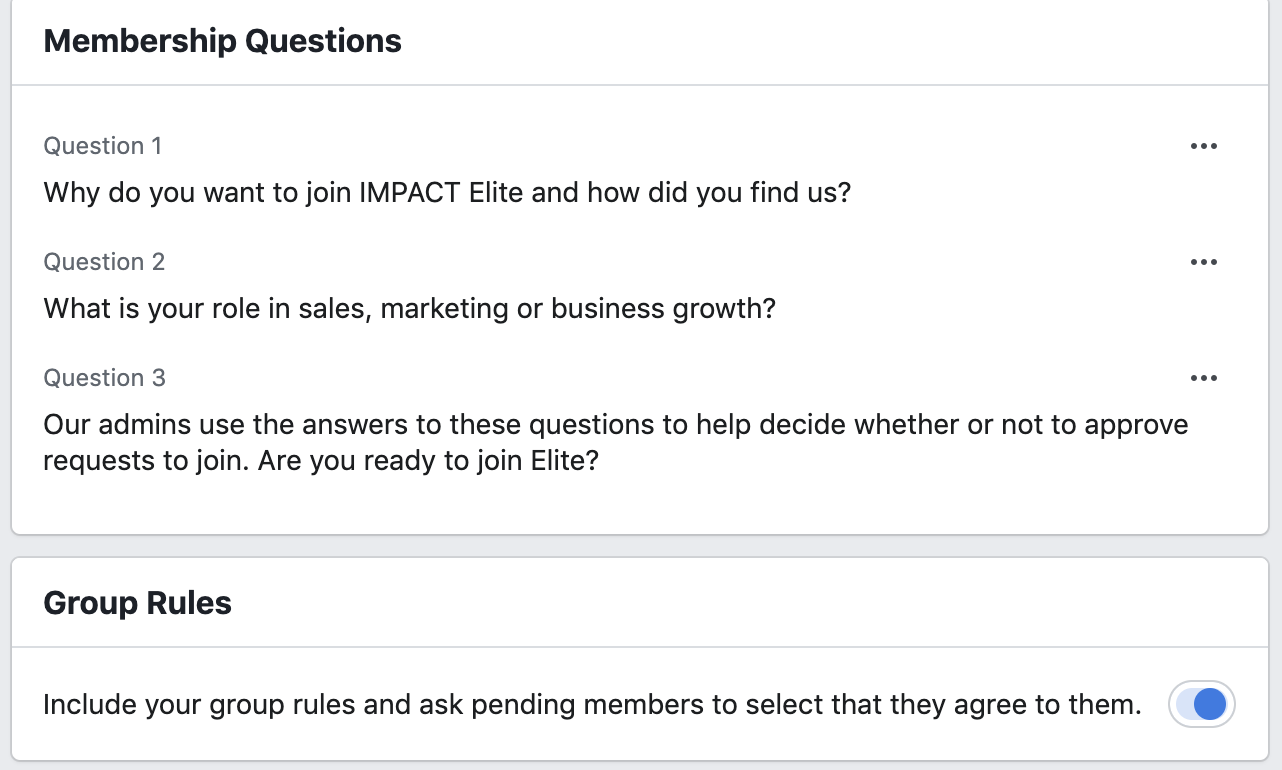
How to address rule breakers
Wherever there are rules in life, there are rule-breakers.
No matter how clearly you outline your rules and remind community members, someone will break them.
It may be completely by accident or it may be due to complete ignorance; either way, you should be prepared to deal with these situations before they arise.
Then, when they do, you can respond appropriately and keep the spirit of your community intact and not be running around frantically.
Whether it’s a small rule that is broken (i.e. posting a job in the main feed instead of the pinned post) or a larger one (hate speech or bullying), you’ll need to address it.
Public messages
If the person in question is an engaged member of your community or their intentions seem good, the best thing you can do is comment publicly kindly reminding them of the rule and directing them on what to do instead.
This is a good reminder both for the offending member as well as for all members who will see it.
On most platforms, you can also turn off further commenting on this post after you’ve addressed it so the issue can be nipped in the bud.
-1.png)
Private messages
In other situations, you may want to message someone privately and let them know that you appreciate their contribution but would like to help it be best received by the community.
This allows you and the member to have a more personal and two-way conversation.
Removing the post
Finally, you can always just remove the post entirely. This is likely something you’ll only turn to in rare instances, but sometimes it does need to happen.
Some community platforms will give you the option to notify the person of the reason you’re removing their content as you do so.
On Facebook, for example, when you delete a post that breaks the rules of your community, you can easily reference the related rule. Just check the box for “share violated rules” before sending the notification that you’ve removed the post.
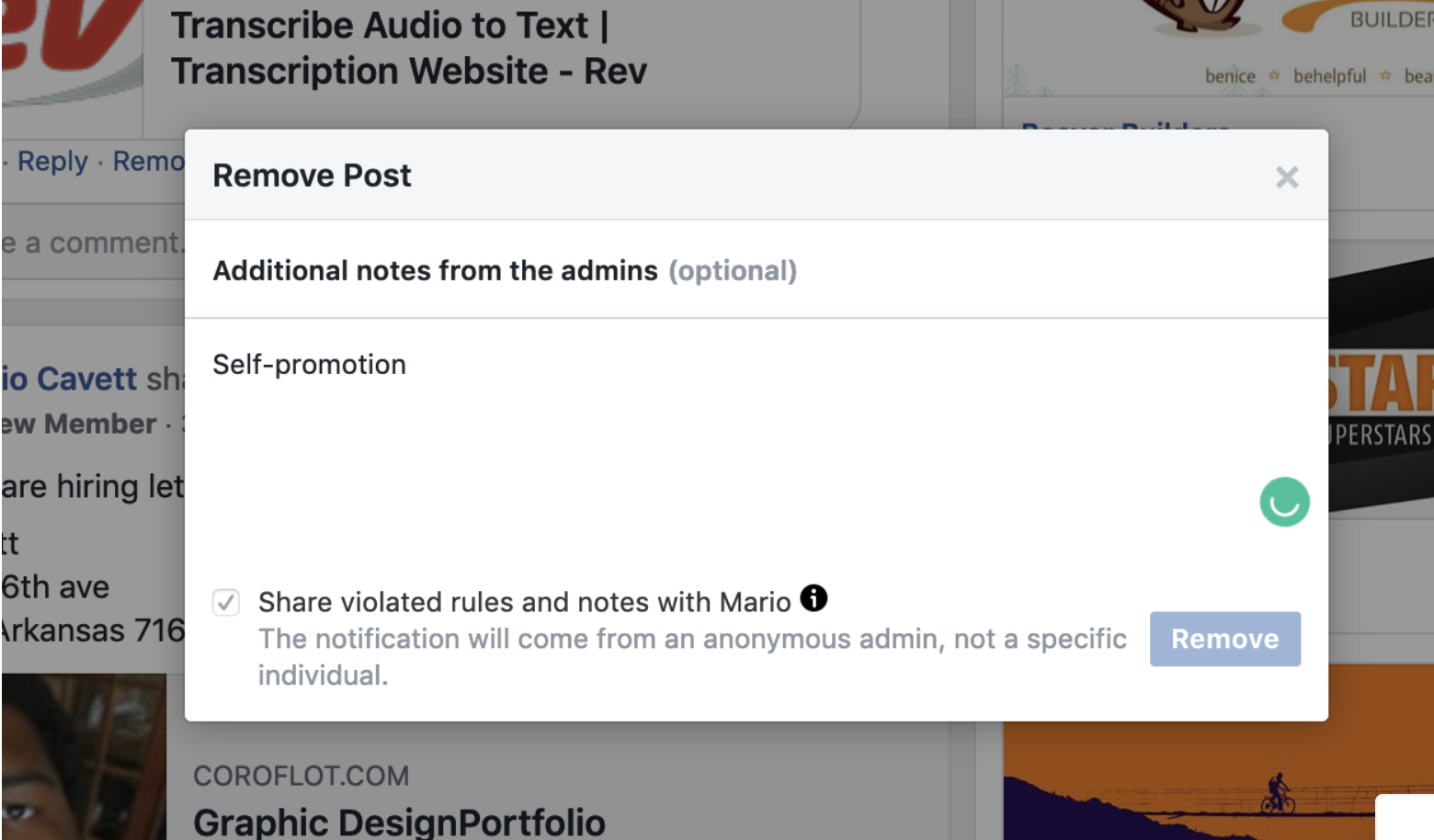
However, if you find yourself doing this often, it may be time to moderate every post before it’s posted live to your community.
Overall, if you choose to have a zero-tolerance policy, just be sure to make this very clear to members as they join.
Blocking members & reporting content
While spammers and trolls aren’t likely to be looking for your community rules, you’ll still have to address spam content at some point in your community management career.
Especially since Facebook can now hold group admins personally accountable for not keeping group content up to Facebook’s community standards.
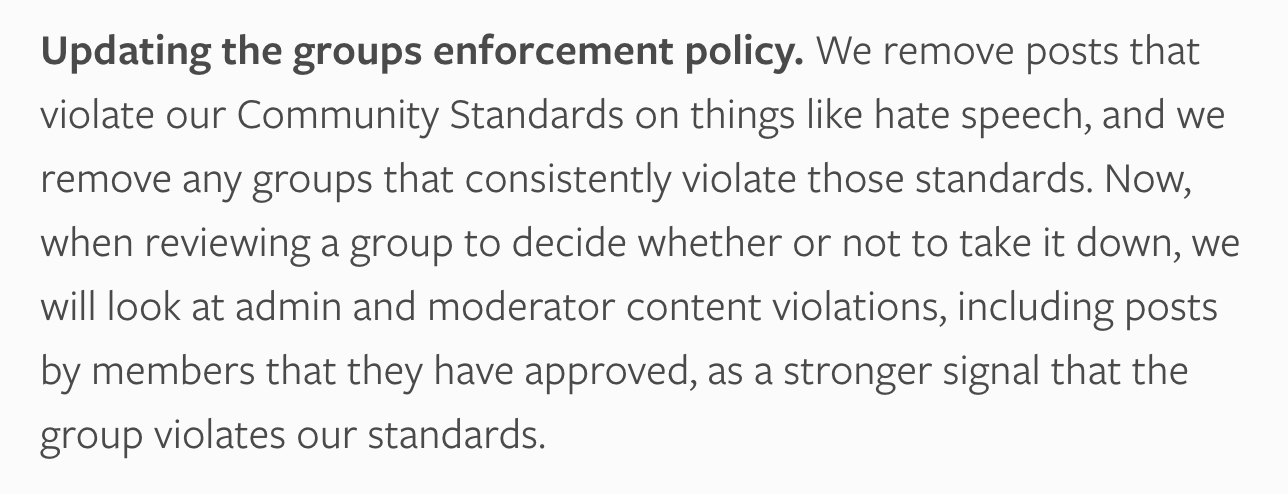
Whenever I delete content, I often take a screenshot first, just in case any questions arise. I like to have a record of all the things in my community, no matter what.
Once you’ve removed the content, you may also want to remove and block the person responsible for posting it.
For reference, in my 18 months of managing IMPACT Elite, I’ve only had to block five people from the community.
Out of 5,300, that’s not bad at all.
Most slipped in and posted some clearly copied-and-pasted spam content that they’re dumping all over the internet, but I did have to block one person for being hateful or disrespectful one time.
Keep in mind, you should not immediately remove any and all sensitive or controversial content.
Just because something sparks a debate does not necessarily mean it should be removed.
This may be content that violates any standard community guidelines such as hate speech, bullying, spam links, and completely unrelated content.
Though difficult to face, sometimes, these things need to start addressed openly to start dialogue and prevent it from happening again in the future.
PSA: Being a community manager is HARD.
So much of what we do is subjective by nature and, at times, it requires us to address very uncomfortable topics.
Watch this video in which I share my experience 👇
 https://videos.impactplus.com/watch/TbEan5Hjz7n91mgRhcRYZv?
https://videos.impactplus.com/watch/TbEan5Hjz7n91mgRhcRYZv?
If you find yourself struggling as a community manager, just remember that it’s okay to reach out and talk to someone or ask for help.
Changing the rules over time
While it may be tempting to make an exception or let things slide once in a while, it’s a slippery slope.
If you let one job posting sit in your main feed, others will see it and follow suit - believe me, I’ve seen it happen first-hand.
As a community manager, you need to stick to your rules and enforce them consistently.
That being said, however, your rules should not be set in stone.
If your community continuously wants to do something that goes against your rules, it may be time to consider a solution or a change to the rules.
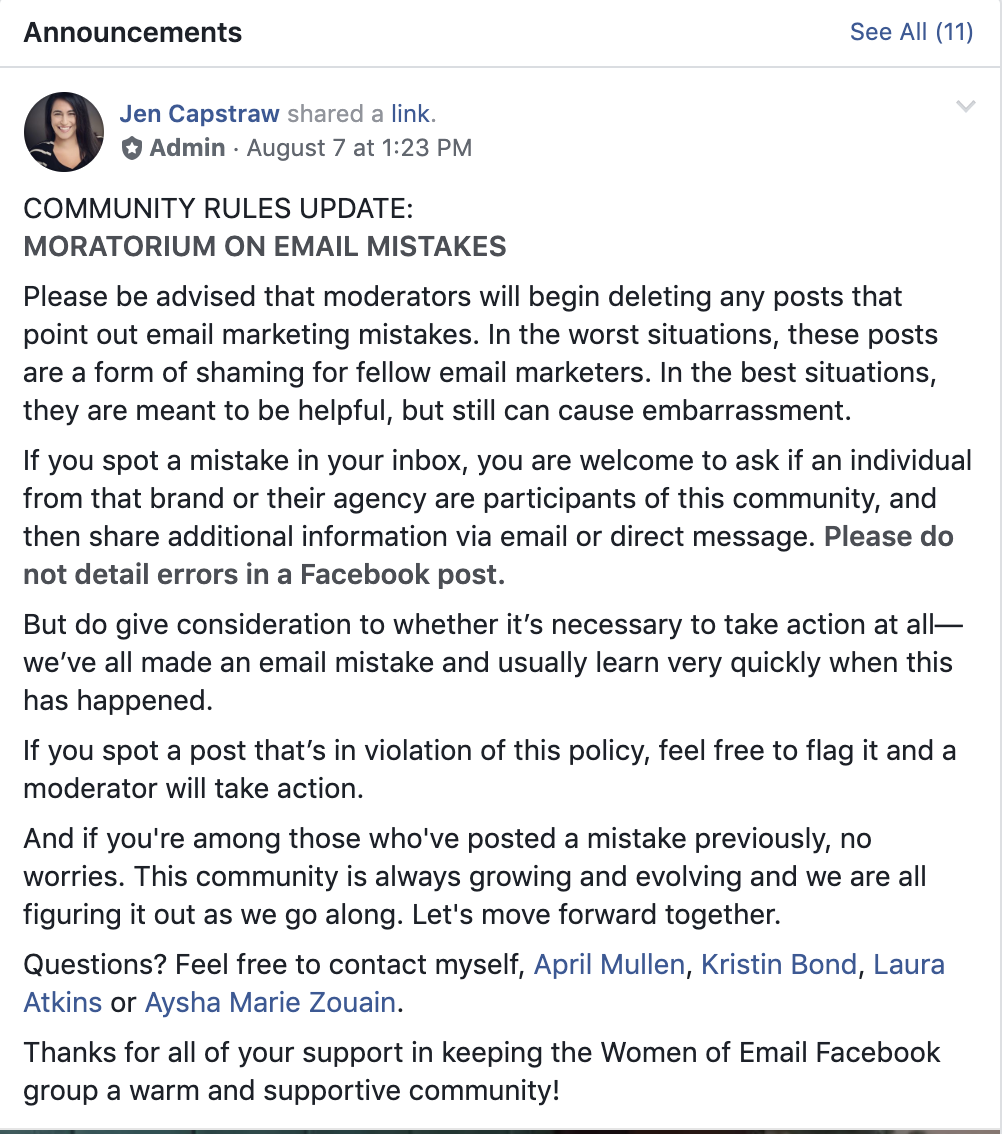
Consider this example from The Women of Email group. The admins here noticed a behavior and made an update to address it professionally and for the overall good of the community.
In IMPACT Elite, we’ve taken similar action. We now have a monthly pinned post for upcoming events so members can share local events all in one place. We instituted this change after we saw several members posting about events in the main group feed.
One final reminder
Online communities can be incredibly powerful tools for forging new connections, deepening existing relationships learning, and getting help when it is needed.
Just because you, as a community manager, run the place doesn’t mean you’re exempt from the rules.
In fact, you should strive to be a shining example of a perfect community member as it will encourage others to model their behavior after yours.
Remember, consistency is key. Create clear rules, follow them, and enforce them consistently, and you will create a community that is both a pleasure to manage AND a pleasure to belong to.


Order Your Copy of Marcus Sheridan's New Book — Endless Customers!